

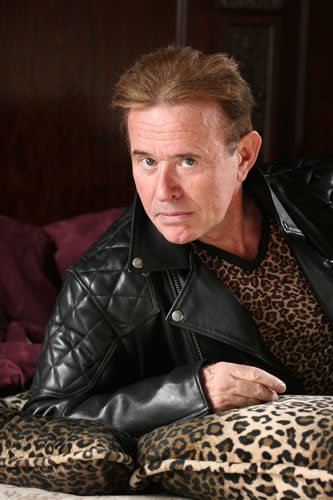 David Del Tredici: Oh, what a nicely phrased question.
My relation to the voice has been as idiosyncratic as my composing.
That is to say, the first real piece I wrote for voice was called I Hear an Army [(1964), for soprano and
string quartet], and it was extremely difficult. I'm not a singer
and I really didn't know singers, but I wrote a terrifically hard part.
By coincidence it was for the Tanglewood Music Festival, and the singer
they had hired was a young girl named Phyllis Bryn-Julson.
She'd never sung before, so they put my piece together with her accidentally.
She was terrific! She did it so easily that I said, "Well, I'm gonna
write her another piece. This is easy vocal writing." I wrote
Night Conjure-Verse [(1965),
for soprano, mezzo-soprano (or counter-tenor), and chamber ensemble] which
was a little harder. Then the next year I wrote something called Syzygy [(1966), for soprano, horn, and
orchestra] which is just unbelievably difficult. But Phyllis did them
so easily that I really thought that was what singers did. [Both chuckle]
After they were all done and I had a little more world experience, I realized
I'd created three white elephants and wondered if anyone else in the world
could even sing them. So really in a way, Phyllis shaped my vocal
style because of that burst of being able to write high, low, and jumping
around like an instrument. I've always somehow thought of the voice
in terms of that kind of variety and extreme extension.
David Del Tredici: Oh, what a nicely phrased question.
My relation to the voice has been as idiosyncratic as my composing.
That is to say, the first real piece I wrote for voice was called I Hear an Army [(1964), for soprano and
string quartet], and it was extremely difficult. I'm not a singer
and I really didn't know singers, but I wrote a terrifically hard part.
By coincidence it was for the Tanglewood Music Festival, and the singer
they had hired was a young girl named Phyllis Bryn-Julson.
She'd never sung before, so they put my piece together with her accidentally.
She was terrific! She did it so easily that I said, "Well, I'm gonna
write her another piece. This is easy vocal writing." I wrote
Night Conjure-Verse [(1965),
for soprano, mezzo-soprano (or counter-tenor), and chamber ensemble] which
was a little harder. Then the next year I wrote something called Syzygy [(1966), for soprano, horn, and
orchestra] which is just unbelievably difficult. But Phyllis did them
so easily that I really thought that was what singers did. [Both chuckle]
After they were all done and I had a little more world experience, I realized
I'd created three white elephants and wondered if anyone else in the world
could even sing them. So really in a way, Phyllis shaped my vocal
style because of that burst of being able to write high, low, and jumping
around like an instrument. I've always somehow thought of the voice
in terms of that kind of variety and extreme extension.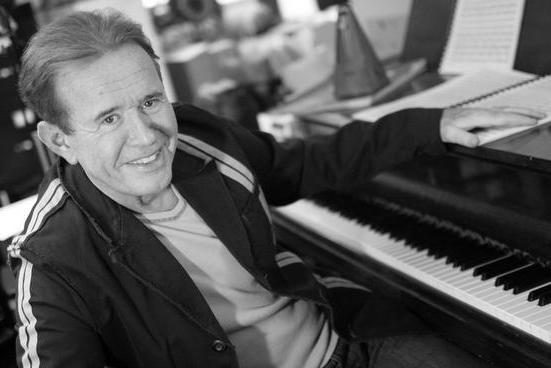 Del Tredici: Actually I'm a very poor estimator of the length
of a piece because I tend to think of my pieces as the succession of ideas
contained. If one movement is one idea, I think it's short.
It's one! And also, because I'm a pianist, I play it on the piano
much more quickly than an orchestra would play it because of the lack of
sustaining power. I think I played Final Alice at 40 minutes, and in fact
it came out to 55 or 60. So I'm not a good judge. Composers,
I think, are notorious for not estimating correctly.
Del Tredici: Actually I'm a very poor estimator of the length
of a piece because I tend to think of my pieces as the succession of ideas
contained. If one movement is one idea, I think it's short.
It's one! And also, because I'm a pianist, I play it on the piano
much more quickly than an orchestra would play it because of the lack of
sustaining power. I think I played Final Alice at 40 minutes, and in fact
it came out to 55 or 60. So I'm not a good judge. Composers,
I think, are notorious for not estimating correctly.  Del Tredici: [With amused pleasure] Ironically it's
true. It's interesting, when somebody really wants to do something
special, they do a piece of mine because there aren't that many white elephants
roaming the musical plains!
Del Tredici: [With amused pleasure] Ironically it's
true. It's interesting, when somebody really wants to do something
special, they do a piece of mine because there aren't that many white elephants
roaming the musical plains!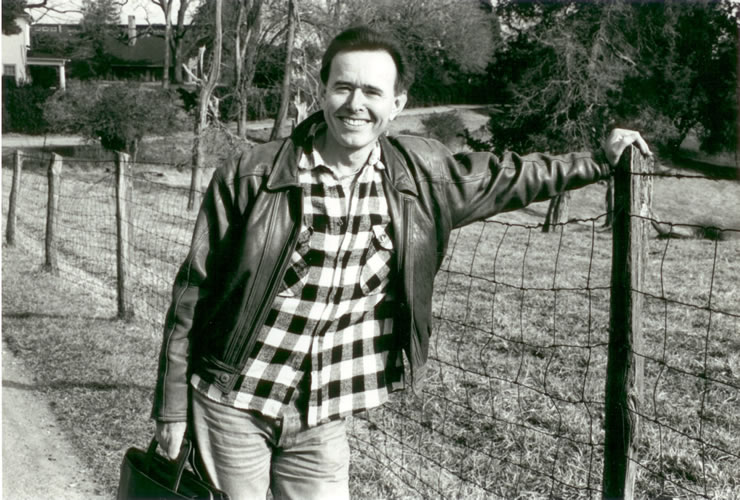 Del Tredici: No, no; he said to me, [in a disinterestedly
agreeable tone of voice] "Do whatever you want." But the Chicago Symphony
has a very enlightened view of such things. Thinking of more traditional
expressions of music — like the quartet or the symphony
or the brass quintet — I wish I felt like
writing them because a lot of groups ask me, and I want to be able to, but
at this point, somehow, I'm afraid to say I will, for fear... I don't know
what I fear... that I won't be able to do it. I guess that's always
a fear. Although I've never not been able to write something I wanted
to write, it is an occupation full of superstition. It's not like
composing isn't like something you learn and, "Oh!" . . . you just do it
for the rest of your life. When you look at great composers, they
had periods where they were wonderful, and then some composers just got
worse and worse! Think of someone like Schumann... of course he went
crazy, whatever that means... he deteriorated. With Hugo Wolf, all
those songs come in a very short span. Someone like Verdi is a great
exception. He did everything right — successful,
rich, a patriot, everyone loved him, and he wrote his best piece when he
was in his eighties. [Both chuckle]
Del Tredici: No, no; he said to me, [in a disinterestedly
agreeable tone of voice] "Do whatever you want." But the Chicago Symphony
has a very enlightened view of such things. Thinking of more traditional
expressions of music — like the quartet or the symphony
or the brass quintet — I wish I felt like
writing them because a lot of groups ask me, and I want to be able to, but
at this point, somehow, I'm afraid to say I will, for fear... I don't know
what I fear... that I won't be able to do it. I guess that's always
a fear. Although I've never not been able to write something I wanted
to write, it is an occupation full of superstition. It's not like
composing isn't like something you learn and, "Oh!" . . . you just do it
for the rest of your life. When you look at great composers, they
had periods where they were wonderful, and then some composers just got
worse and worse! Think of someone like Schumann... of course he went
crazy, whatever that means... he deteriorated. With Hugo Wolf, all
those songs come in a very short span. Someone like Verdi is a great
exception. He did everything right — successful,
rich, a patriot, everyone loved him, and he wrote his best piece when he
was in his eighties. [Both chuckle]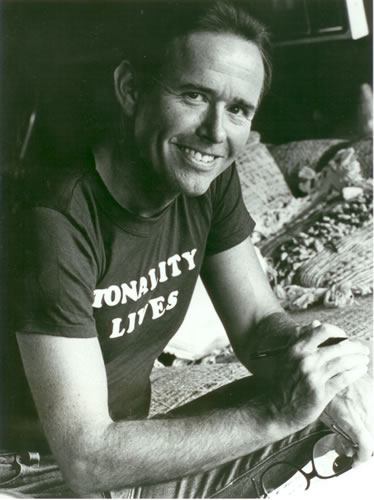 Duffie: And yet the rest of music seems to be going from Mahler
back through Mozart in its tonality and simplicity!
Duffie: And yet the rest of music seems to be going from Mahler
back through Mozart in its tonality and simplicity!Generally recognized as the father
of the Neo-Romantic movement in music, David Del Tredici has received numerous
awards (including the Pulitzer Prize) and has been commissioned and performed
by nearly every major American and European orchestral ensemble. "Del Tredici,"
said Aaron Copland, "is that rare find among composers — a creator with
a truly original gift. I venture to say that his music is certain to make
a lasting impression on the American musical scene. I know of no other composer
of his generation who composes music of greater freshness and daring, or
with more personality."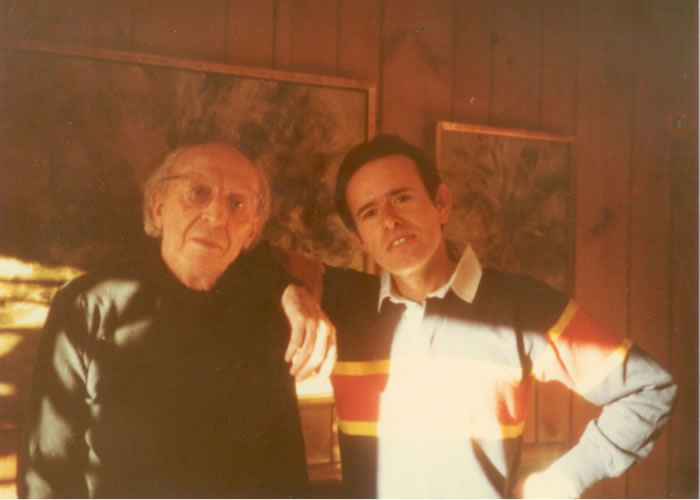
Much of his early work consisted of elaborate vocal settings of James Joyce (I Hear an Army; Night Conjure-Verse; Syzygy) and Lewis Carroll (Pop-Pourri, An Alice Symphony, Vintage Alice and Adventures Underground, to name just a few). More recently, Del Tredici has set to music a cavalcade of contemporary American poets, often celebrating a gay sensibility (three examples: Gay Life, Love Addiction and Wondrous the Merge). OUT Magazine, in fact, has twice named the composer one of its people of the year. Over the past several years he has ventured into the more intimate realm of chamber music with String Quartet No. 1, Grand Trio (brought to life by the Kalichstein-Laredo-Robinson Trio and recently printed by Boosey & Hawkes), and — harkening to his musical beginnings as a piano prodigy — a large number of solo-piano works (Gotham Glory, Three Gymnopedies, Ballad in Yellow, S/M Ballade, and Aeolian Ballade). Still, the extravagant Del Tredici remains at large and busy. In May 2005 Robert Spano conducted the Atlanta Symphony and Chorus in the premiere and subsequent recording of Paul Revere's Ride, recently nominated for the 49th Annual Grammy Awards as the Best New Classical Composition of 2006. November 2005 held the world premiere of the melodrama Rip Van Winkle with the National Symphony Orchestra conducted by Leonard Slatkin and narrated by world famous Broadway actor, Brian Stokes Mitchell. In recent years several Del Tredici CDs have abounded: on Deutsche Grammophon, an all-Del Tredici CD (released in its highly-regarded "20/21" series) featuring conductor Oliver Knussen, soprano Lucy Shelton and the Netherlands' ASKO Ensemble; on the Music and Arts label, a pair of recent Del Tredici song cycles featuring soprano Hila Plitmann with the composer at the piano; on Dorian, In Wartime, a spectacular new work for concert band; and on Koch, a selection of piano compositions played by Anthony de Mare. Among past recordings were two best-sellers — Final Alice and In Memory of a Summer Day (Part I of Child Alice); the latter work won Del Tredici the Pulitzer Prize in 1980. March 2007 marked David Del Tredici's 70th birthday, with concerts given throughout the year, including the premiere of Magyar Madness, a chamber piece for clarinet and string quartet, commissioned by Music Accord for clarinetist David Krakauer and the Orion String Quartet. Another premiere was S/M Ballade for solo piano which was commissioned and performed by Marc Peloquin. Recent publications include a collection entitled Songs for Baritone and Piano as well as the score and parts for the piano trio entitled Grand Trio. A second printed volume of solo piano pieces is in progress which will include Gotham Glory and Three Gymnopedies. Distinguished Professor of Music at The City College of New York, Del Tredici makes his home in Greenwich Village. David Del Tredici is published exclusively by Boosey & Hawkes. |
This interview was recorded in a dressing room downstairs at Orchestra
Hall in Chicago on January 8, 1990. Portions (along with recordings)
were used on WNIB in 1992 and 1997. This transcription was made and
posted on this website in 2011.
To see a full list (with links) of interviews which have been transcribed and posted on this website, click here.
Award - winning broadcaster Bruce Duffie was with WNIB, Classical 97 in Chicago from 1975 until its final moment as a classical station in February of 2001. His interviews have also appeared in various magazines and journals since 1980, and he now continues his broadcast series on WNUR-FM, as well as on Contemporary Classical Internet Radio.
You are invited to visit his website for more information about his work, including selected transcripts of other interviews, plus a full list of his guests. He would also like to call your attention to the photos and information about his grandfather, who was a pioneer in the automotive field more than a century ago. You may also send him E-Mail with comments, questions and suggestions.